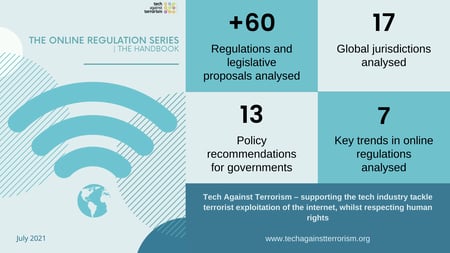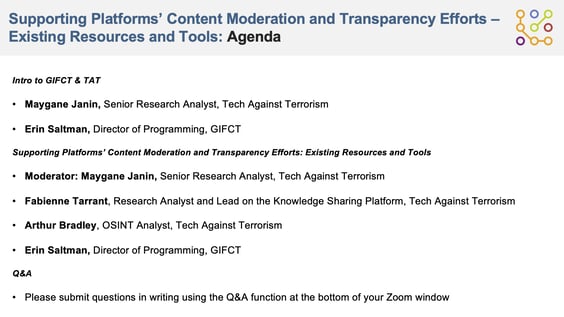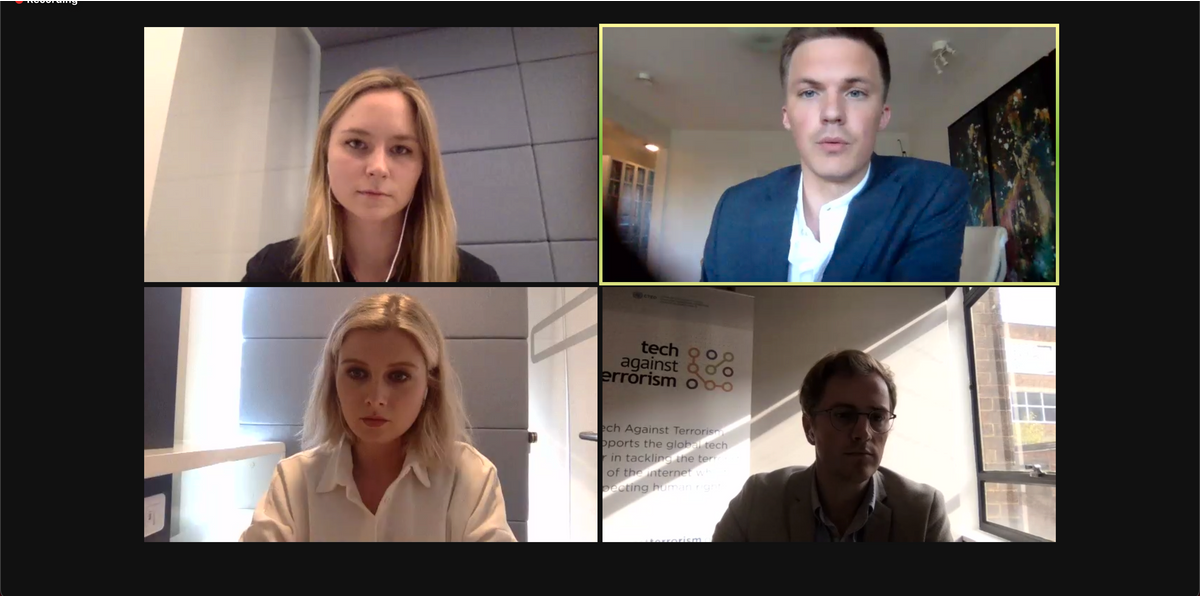Reader's Digest – 23 July 2021
Our weekly review of articles on terrorist and violent extremist use of the internet, counterterrorism, digital rights, and tech policy.
The Online Regulation Series Handbook
- Last week we launched our Online Regulation Series Handbook. Following up on our first Online Regulation Series in 2020, the Handbook provides insight and analysis of over 60 regulations and legislative proposals in 17 countries, and includes our recommendations for policymakers. You can access the handbook here.
With this Handbook, we provide a state of play of online regulation and share practical insights for tech companies to improve their understanding of the complex and fast changing global regulatory landscape.
 |
Tech Against Terrorism Updates
- On 26 July, our Director, Adam Hadley, will join the GIFCT's 2021 Global Summit Series to discuss the terrorist and violent extremist online threat landscape. You can register for the event here.
- Adam Hadley, was quoted in a recent Politico article, in which he discusses Covid-19 misinformation, and the need to clearly differentiate between “racist content” and “terrorist content”.
- Thank you to everyone who tuned in for our latest TAT & GIFCT E-learning Webinar on, “Supporting Platforms’ Content Moderation and Transparency Efforts: Existing Resources and Tools”. If you were unable to attend and would like to access a recording, please get in touch with us at contact@techagainstterrorism.org You can register for the event here.
 |
Terrorist Content Analytics Platform (TCAP)
- Last week (12.07-18.07) the TCAP identified and verified 527 URLs containing terrorist content and sent 248 alerts to 25 tech companies. 79% of this content is now offline.
- We are hosting our July TCAP Office Hours on 27 July at 5pm BST and on 28 July at 12pm BST. If you would like to learn more about the TCAP, make sure to register here.
Top Stories
- Facebook launched its “Sensitivity Content Control” feature on Instagram, allowing users to decide how much ‘sensitive content’ appears on their “Explore” page.
- Kosovo repatriated 11 of its citizens accused of being members/sympathisers of the Islamic State (IS) from camps in Syria.
- The European Union Council renewed measures to combat terrorism for another six months. The list of designated terrorist entities includes 14 individuals and 21 groups and organisations. Those on the list are subject to the freezing of the funds and other financial assets within the EU.
- Two California residents with links to the Three Percenters were indicted for an alleged plot to firebomb the offices of California’s Democratic governor in Sacramento. The two also discussed attacking the offices of Facebook and Twitter in response to the suspension of former President Trump’s accounts.
- On 20 July, the Islamic State claimed an attack that killed at least 30 people in Baghdad’s al-Sadr City on the eve of the Eid al-Adha holiday.
- The leader of two UK designated terrorist groups, System Resistance Network and Sonnenkrieg Division, was convicted of “fundraising for an extremist group” and sentenced to seven years in prison.
- A 21-year-old man is facing charges after allegedly plotting a mass shooting at Ohio University, targeting exclusively women.
- 22 July marked the tenth anniversary of the 2011 Oslo and Utøya attacks, during which right-wing terrorist, Ander Breivik, killed 77 people.
Counterterrorism
- Tunisia’s Evolving Counterterrorism Strategy: Anouar Boukhars investigates the strategic enhancement of Tunisia’s security apparatus meant to combat al-Qaeda in the Islamic Maghreb (AQIM) and the Islamic State (IS). Boukhars demonstrates the improvement in various facets of the counterterrorism response, including “intelligence gathering” and “interagency coordination” as Tunisia takes a more holistic approach to counter terrorism. The creation of the National Commission for the Fight against Terrorism (CNLCT) is of particular significance through its application to “halt the funding of terrorism” and its implementation of a series of initiatives “to engage civil society and the private sector to proactively respond to the challenge of violent extremism”. Boukhars concludes by suggesting a series of recommendations on “addressing the causes, not just symptoms, of terrorism and violent extremism”, as this will underpin the “ultimate effectiveness of these reforms”. (Boukhars, Africa Centre for Strategic Studies, 16.07.21)
- Technology and Terrorist Financing: Jessica Davis examines the increasing exploitation of technology by terrorists for financing purposes. Davis focuses on exploring the “raising and using of funds”, “moving money” and the “obscuring of the source and destination of funds”. Davis also considers the current counterterrorist financing responses, analysing the “following the money; stopping the money; understanding the money” and “financially deplatforming the terrorists” approaches in place. Davis also comments on the potential impact on civil society and human rights that comes with this form of counterterrorism, believing it is critical to “keep in mind the potential abuses”, and devise ways to mitigate impacts on human rights. (Davis, GNET, 19.07.21)
Far-right violent extremism and terrorism
- Sacramento Democratic Headquarters Plot Reveals Ongoing Impact of Anti-Government Ideology: The Anti-Defamation League (ADL) reflects on the recent indictment of two men with ties to the designated terrorist group, the Three Percenters, on charges of an alleged plot to “start a movement to overthrow the government” and how this underscores the continued threat from anti-government ideologies in America. Using a sampling of incidents dating back to 2016, the ADL discusses the increasing radicalisation of a segment of society “animated by anger over former President Trump’s election loss” and “profound opposition to democratic norms”. The resulting hate has led to the targeting of both Democrat and Republican Party officials, demonstrating a “growing anti-government sentiment and political polarisation” in the country. (Anti-Defamation League, 16.07.21)
For any questions, please get in touch via:
contact@techagainstterrorism.org
- News (239)
- Counterterrorism (54)
- Analysis (52)
- Terrorism (39)
- Online Regulation (38)
- Violent Extremist (36)
- Regulation (33)
- Tech Responses (33)
- Europe (31)
- Government Regulation (27)
- Academia (25)
- GIFCT (22)
- UK (22)
- Press Release (21)
- Reports (21)
- US (20)
- USA (19)
- Guides (17)
- Law (16)
- UN (15)
- Asia (11)
- ISIS (11)
- Workshop (11)
- Presentation (10)
- MENA (9)
- Fintech (6)
- Threat Intelligence (5)
- Webinar (5)
- Propaganda (3)
- Region (3)
- Submissions (3)
- Generative AI (1)
- Op-ed (1)

